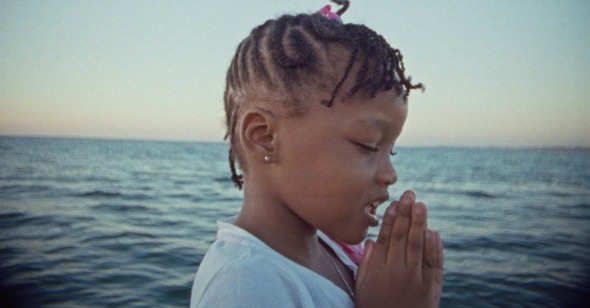Maternal Instinct
by Tayler Montague
Black Mother
Dir. Khalik Allah, U.S., Grasshopper Film
Black Mother represents an elevation of filmmaker Khalik Allah’s storytelling form. As seen in his previous work, Field Niggas (2015), Allah strategically trains his camera on the inhabitants of a specific place, people who are largely unseen unless one lives amongst them. In Field Niggas it was 125th and Lex, the hangout spot for K2 users. In Black Mother, we meet various characters living in Jamaica, where the director’s maternal family hails from. The transfixing close-ups of Jamaicans are evidence that the eye is the window to the soul; each dead-on stare into the lens heightens the personal and political histories overlaid on the soundtrack. This is a film in which the aural landscape is just as important as the visual imagery. Patois dominates the film, a choice I greatly admired; to tell the history of the people in their native tongue proved difficult for some, as evidenced by the Q&A at True/False Film Fest, where I first saw it. But what better way is there to tell it? Allah’s work is rooted in authenticity, not translation.
Following the maternal theme, the film is broken into trimesters. This is one of the only structuring devices the filmmaker employs, as the time frame is never fully made clear and Black Mother isn’t edited in sequence. Things are seen, disappear, and then seen again as if hoping we’ll have a greater appreciation or different perception of them the second time around. The film moves quickly, back and forth. And while processing the juxtaposition of images and sounds, you are forced to challenge your perceptions. An elderly woman can look homeless and rundown in one frame and wise and regal later, implying that such traits are not mutually exclusive.
The first trimester centers on the history of Jamaica, the second focuses on the women of the island, and the last finds Allah dealing with the death of a family patriarch. All of these voices converge, but they never feel convoluted. I remain in awe of Allah’s personal commitment to tell this story, largely on his own, shooting, editing, and recording sound. Black Mother is part carefully considered art-house film, part fieldwork. The images on the screen operate as a form of collage. Weaving in and out of black-and-white, grainy 16mm film and crisp overhead digital shots of landscapes, the film adds textured layers to an environment already teeming with natural beauty. It’s clear that we’re experiencing Jamaica not as a tourist, but through familiar eyes. The film is incredibly personal, and Khalik makes appearances—mostly through voice, though I spotted him briefly by a body of water holding what could either be a Bible or a Bolex, the frame not lingering long enough for me to decipher.
After my first screening of the film, I spoke with a woman who critiqued what she perceived as misogyny and the dominance of the male gaze. There are lingering shots of sex workers in Jamaica, many of them young girls, looking into and then shyly looking away from the lens. One of the girls is unabashedly staring down the camera, unfazed by the assumptions the audience might have about her. She’s later seen on a bed with a customer, who’s smacking her ass. This interaction flits between fact and fiction, as we’re unsure whether or not it’s played up by the presence of cameras. It’s inevitable that a film shot by a man would operate within the confines of the male gaze, and while there is some validity in the accusation of misogyny, it does the film and its viewers a disservice to not further unpack this. Meeting the filmmaker on his own terms can help us better understand Black Mother’s point of view and can lead to a much more productive conversation about the underlying sources of the images we see.
Khalik Allah is a Five Percenter, part of the Nation of Gods and Earths, a religion deeply associated with Hip Hop: Rakim, Big Daddy Kane, Jay-Z, and Wu-Tang Clan, to name a few. Within this religion, a major theme in the film, Black men are Gods and Black women are Earths. The images of naked Black women holding the fruit of the Earth in the film are signifiers of these beliefs, not just totems for objectification. Black Mother is not a work of art that can be separated from the artist, as he’s a figure present in every frame and historical reference on screen. Even when Allah isn’t physically there, his spirit is felt throughout. Thisfilmmarks the beginning of a new brand of Black auteurism, exhibited by Allah and his contemporaries, and including but not limited to Kahlil Joseph, whose Fly Paper—which features Allah’s voice—is very much in conversation with Black Mother. I’m excited to see what he decides to fix his camera on next.
This review originally appeared as part of Montague's True/False Festival 2018 report.
